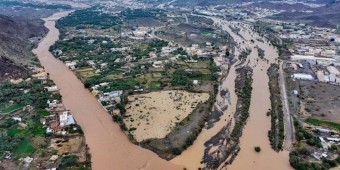By: George Kurzom
https://www.maan-ctr.org/magazine/article/3749/

Exclusive to Environment and Development Horizons (Afaq magazine):
Last November, the 27th Conference of the Parties to the United Nations Framework Convention on Climate Change (COP27), took place in the Egyptian coastal city of Sharm el-Sheikh, with the Coca Cola beverages company as the sponsor of the conference. This raised many questions on the pressures exerted by the monopolistic companies on these conferences and thus their social and cultural impact as well as the impact on the climate.
It goes without saying that the contribution of this company to the spread of polluting plastic is the largest in the world, and therefore its sponsorship of the conference is a striking example of the practice of what is known as green washing, as this company, like many other global monopolies, is trying to market itself as keen to protect climate, in order to cover up its activity polluting the environment and destroying the ecosystem.
Over the years, climate conferences have transformed into trade fairs, with major corporations, start-ups and industrial systems setting up booths and sideline shops as a tool to promote their business relationships.
In a sense, climate conferences have become a tool in the hands of politicians and representatives of major international companies to attract the attention and spread untruthful "green promises" that tend to garnish the reality of the pollutant and those destroying the climate and make them look better.
These conferences, which are supposed to be an important tool for dealing with the environmental crisis that is threatening the world, have turned into a media festival full with advertisements and dramatic slogans.
And no matter what decisions are concluded from these conferences, it has repeatedly aroused frustration, and assured that humans will continue to produce enormous amounts of greenhouse gases.
The COP27 conference coincided with the decline in efforts to reduce greenhouse gas emissions, as the demand for natural gas increased due to the war in Ukraine which led to deepening of the energy crisis , and the growing tension between China and Russia on the one hand, and the United States on the other hand prevented the formulation of an international policy to encourage a low carbon economy that does not depend on fossil fuels.
Another disturbing aspect is that the conference took place in a country that suppresses environmental activists. This is more than a symbolic expression of the hopeless sad state of the civil movements trying to change the environmental and political reality. Rather, the suppression of environmental-climate movements finally moved to the streets of London, where the COP26 conference (Glasgow Conference) was held.
Instead of acknowledging the limits of these annual climate conferences and looking for other possible ways of action, environmental activists seem to continue pinning their hopes on them.
Deals behind closed doors
Due to pressure from countries such as the USA, Egypt, Saudi Arabia, Russia and China, and due to the presence of more than 630 lobbyists from the oil and gas industries at the conference - the agreement drafted at the conference did not contain critical clauses to combat global warming.
In other words, the agreement did not include any clear commitment to stop using fossil fuels, and it lacked a commitment to significantly reduce greenhouse gas emissions starting in 2025.
Also, the agreement does not include the commitments of all countries worldwide to update the maximum amount of emissions reduced by next year (as was originally expected according to the decisions of the Glasgow Conference in 2021), meaning that this agreement protects fossil fuel industries and not the human population.
The truth is that the big deals at conferences like this are done “in the dark” behind closed doors.
Who is allowed in those rooms to discuss global climate policy? The ministers and chief executives of giant fossil fuel and mining companies, such as British Petroleum, Rio Tinto and Shell.
It's them - the oil companies and the politicians - who make the decisions about carbon emissions.
Compensation fund on paper
The greatest achievement of the climate conference is, for the first time, the agreement to establish a new fund to finance the treatment of the damage caused by rich and polluting countries to developing countries that did not create the climate crisis, but were subject to its worst forms of disasters. This is the first time that rich countries have agreed to this demand, which was the focus of the conference.
Our source of information, those who are familiar with the dynamics of the negotiations, did not rush to celebrate (the compensation fund). They stressed that "the fund is no more of a symbolic victory than a real success."
They added: "The money will not simply go directly to Pakistan or the islands in danger of sinking, there is agreement in principle that it should do so - but there is no decision on who will pay, how much and when, and the discussion of the details has been basically postponed until the next conference."
The establishment of the fund is not a guarantee that rich countries will actually deposit the money, since most of them have not fulfilled the commitments they have made in the past to transfer the money, but, in many cases, the transferred funds are treated as loans.
According to the decision made, representatives from different countries will work together this year to determine exactly how the compensation fund will be created, which countries will have to contribute to it and where the money will be transferred.
According to the agreement, contributions will be collected from advanced industrial countries and other private and public sources, such as international financial institutions.
Funds will mainly be transferred to the most vulnerable countries, although middle-income countries that have been severely affected by climate change disasters should also be included in the compensation fund program.
The new agreement also highlights the failure of rich countries to allocate $100 billion annually to poor countries, until 2020, to combat the climate crisis - a commitment made in the past that has not been kept.
Continued use of Fossil fuels
Despite the demands of some countries, there is no commitment in the text of the agreement to reduce the use of fossil fuels - which is the main cause of global warming - but rather a repetition of the previous commitment made at the Glasgow Conference in 2021, i.e. the gradual phasing out of coal. This is even though some countries, such as India, have lobbied towards including emissions reductions in the agreement.
Among those who opposed the reduction was Saudi Arabia, the largest oil exporter in the world. The fact that more than 630 active participants of major industrial companies attended the conference is a clear indication of their impact on the decisions taken.
The irony is that the final text of the agreement was softened compared to previous drafts, due to the pressure exerted by Saudi Arabia and China.
An earlier draft included a commitment to increase the share of renewable energies, but the signed agreement also referred to the use of "low-emissions" energy - a phrase intended to allow continued use of gas.
The agreement also states that it " calls on the parties to consider further actions to reduce greenhouse gas emissions by 2030," and does not require parties to do so through a legal binding treaty.
Translated by: Rasha Abu Dayyeh















